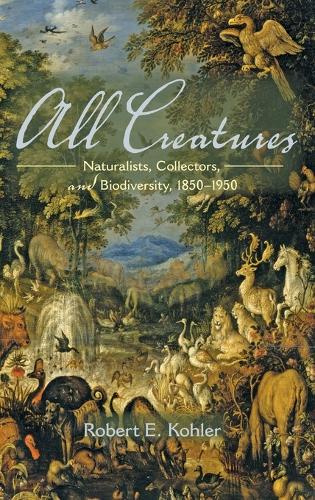
All Creatures: Naturalists, Collectors, and Biodiversity, 1850-1950
(Hardback)
Publishing Details
All Creatures: Naturalists, Collectors, and Biodiversity, 1850-1950
By (Author) Robert E. Kohler
Princeton University Press
Princeton University Press
17th October 2006
United States
Classifications
Professional and Scholarly
Non Fiction
577.09034
Physical Properties
Hardback
384
Width 152mm, Height 235mm
680g
Description
We humans share Earth with 1.4 million known species and millions more species that are still unrecorded. Yet we know surprisingly little about the practical work that produced the vast inventory we have to date of our fellow creatures. How were these multitudinous creatures collected, recorded, and named When, and by whom Here a distinguished historian of science tells the story of the modern discovery of biodiversity. Robert Kohler argues that the work begun by Linnaeus culminated around 1900, when collecting and inventory were organized on a grand scale in natural history surveys. Supported by governments, museums, and universities, biologists launched hundreds of collecting expeditions to every corner of the world. Kohler conveys to readers the experience and feel of expeditionary travel: the customs and rhythms of collectors' daily work, and its special pleasures and pains. A novel twist in this story is that survey collecting was rooted not just in science but also in new customs of outdoor recreation, such as hiking, camping, and sport hunting. These popular pursuits engendered a wide scientific interest in animals and plants and inspired wealthy nature-goers to pay for expeditions. The modern discovery of biodiversity became a reality when scientists' desire to know intersected with the culture of outdoor vacationing. General readers as well as scholars will find this book fascinating.
Reviews
"[A] fascinating and groundbreaking book."--Tim Dee, Times Literary Supplement "In this new, well-argued book, Kohler plays down the importance of laboratory life to naturalists. Instead he puts their scientific achievements into the contexts of the environment they worked in, the social culture of nature-going they often came from, and, lastly, the science of classification in the tradition of the Swedish naturalist Carl von Linne... An important contribution to the history of naturalists in the United States, it is well worth the read."--Peder Anker, Science "Fascinating reading... All Creatures presents an excellent summary of the work and lives of explorers and surveyors. Kohler summarizes the rapidly vanishing field of biological surveys for a broad audience, formidably bringing back old times to explain the birth and growth of surveys, collecting and natural history."--Swen C. Renner, EMBO Reports "In this rich story of discoveries, readers learn of the remarkable natural history work that has identified and named 1.4 million species on Earth... This book portrays the travel, pleasures, and pain of fieldwork in this great century of taxonomy."--Choice "[This book] opens new perspectives on histories of natural history that did not end with the experimentation of the life sciences in the second half of the nineteenth century. It also challenges the reader to rethink the relationship between social history and a culturally informed history of science."--Tobias Cheung, Canadian Journal of History "[Kohler's] treatment is a great general read but at the same time, fills an empty niche in the history of American biological sciences. This volume is highly recommended for students of the history of science at any level."--Larry T. Spencer, Quarterly Review of Biology "Kohler thoughtfully examines the whole issue of surveys versus discoveries and collectors versus explorers... While scientific and environmental circumstances have changed, Kohler has succeeded in restoring these naturalists to their rightful place in the history of natural history."--Mark Madison, International History Review "Despite the spatio-temporal restriction of Kohler's subject, he manages to place it into a context of more general interest and importance by elaborating the environmental, cultural, and scientific backgrounds of survey collecting. Any systematist curious about the processes that have been responsible for filling the filing cabinets of American natural history museums should read this book."--Ronald A. Jenner, The Systematist "Kohler's book will be useful for science educators who wish to broaden their discussions of diversity with an historical dimension. It will be especially useful for those in the United States who can use the book to point to work done in local regions that had significant national and international scientific importance. And, in that sense, the study provides a useful and highly readable source that brings together a lot of recent historical research."--Paul Lawrence Farber, Science Education
Author Bio
Robert E. Kohler is Professor of History and Sociology of Science at the University of Pennsylvania. The recipient of an award for lifetime achievement in his field, he is the author of four previous books on the experimental and field sciences, including "Lords of the Fly: Drosophila Genetics and the Experimental Life".
